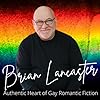Brian Lancaster
Find what works for you, harness your imaginative energy, and just write. There’s a lot of advice on the internet, especially on YouTube, and a lot of self-appointed experts dictating how you should do this. Read it, by all means, but find what works specifically for you. My own advice is personal, and I talk from my own experience.
1. Roughly plan out the whole story: I’ve learnt the hard way, from a pile of unfinished manuscripts, that I need to plan out a story to give me writing goals, a plot and structure and an ending, believable characters, and firm deadlines. I say roughly, because I still keep things loose enough that I can change direction or even the plot line as I’m writing (or change them later, although that often involves a lot of rework) if I think the story or a protagonist is becoming too predictable. I’ve known authors who plan a story to death, leisurely spending time building their worlds, their cast of characters, defining the plot arc and even creating tiny details they plan to include - and then find they’ve lost the impetus to write when they attempt to start a story. Find what works best for you.
2. Try to bulletproof your sensibilities: you are likely to receive harsh criticism during the writing process. Take it on the chin. Some beta readers and a structural editor I used in the past pulled no punches. After getting largely ‘constructive’ feedback on a 150 page crime thriller manuscript I had sweated blood over, I truly went through the five stages of grief until I finally arrived at acceptance. At the beginning I felt like throwing the whole thing into an industrial shredder. Sometimes you need to step away, let the dust settle, and come back later.
3. Pick beta readers carefully: I thoroughly recommend using beta readers to get feedback on the early drafts of your story, but be crystal clear about what you want. Don’t let them get bogged down in providing detailed edits (typos, grammar checks, consistency errors - you can come to that later) but ask them to look at the bigger picture. Most important of all, give them a template or list of the things you are looking for (see my questions below). I had one author/beta reader in the past who wrote things like “I didn’t really get this character, they did nothing for me,” or “there’s too much tell and not enough show.” These are perfect examples of what I call ‘lazy feedback’ because the person provided no examples or context. If this is your beta reader’s preferred style, then decline their assistance. As an author you will be faced with enough of that kind of unhelpful, negative feedback once you're published. I right mainly MM romance-themed novels, so I use the following list of questions:-
1. What did you think of the story as a whole?
2. How did the main characters develop throughout the story?
3. At what point did you feel like “ah, now the story has really begun!”
4. Were there any parts you found yourself skimming?
5. What was your favourite part of the story, and why?
6. What was the most suspenseful moment in the book?
7. How did you feel about the romantic element of the story?
8. Who was your favourite character and why?
9. Were there any moments you wish had lasted longer?
10. What is the theme/message you took away from the story?
1. Roughly plan out the whole story: I’ve learnt the hard way, from a pile of unfinished manuscripts, that I need to plan out a story to give me writing goals, a plot and structure and an ending, believable characters, and firm deadlines. I say roughly, because I still keep things loose enough that I can change direction or even the plot line as I’m writing (or change them later, although that often involves a lot of rework) if I think the story or a protagonist is becoming too predictable. I’ve known authors who plan a story to death, leisurely spending time building their worlds, their cast of characters, defining the plot arc and even creating tiny details they plan to include - and then find they’ve lost the impetus to write when they attempt to start a story. Find what works best for you.
2. Try to bulletproof your sensibilities: you are likely to receive harsh criticism during the writing process. Take it on the chin. Some beta readers and a structural editor I used in the past pulled no punches. After getting largely ‘constructive’ feedback on a 150 page crime thriller manuscript I had sweated blood over, I truly went through the five stages of grief until I finally arrived at acceptance. At the beginning I felt like throwing the whole thing into an industrial shredder. Sometimes you need to step away, let the dust settle, and come back later.
3. Pick beta readers carefully: I thoroughly recommend using beta readers to get feedback on the early drafts of your story, but be crystal clear about what you want. Don’t let them get bogged down in providing detailed edits (typos, grammar checks, consistency errors - you can come to that later) but ask them to look at the bigger picture. Most important of all, give them a template or list of the things you are looking for (see my questions below). I had one author/beta reader in the past who wrote things like “I didn’t really get this character, they did nothing for me,” or “there’s too much tell and not enough show.” These are perfect examples of what I call ‘lazy feedback’ because the person provided no examples or context. If this is your beta reader’s preferred style, then decline their assistance. As an author you will be faced with enough of that kind of unhelpful, negative feedback once you're published. I right mainly MM romance-themed novels, so I use the following list of questions:-
1. What did you think of the story as a whole?
2. How did the main characters develop throughout the story?
3. At what point did you feel like “ah, now the story has really begun!”
4. Were there any parts you found yourself skimming?
5. What was your favourite part of the story, and why?
6. What was the most suspenseful moment in the book?
7. How did you feel about the romantic element of the story?
8. Who was your favourite character and why?
9. Were there any moments you wish had lasted longer?
10. What is the theme/message you took away from the story?
More Answered Questions
Diane
asked
Brian Lancaster:
Are you going to add 'Don't Point at the Moon?" I want to add a review!
About Goodreads Q&A
Ask and answer questions about books!
You can pose questions to the Goodreads community with Reader Q&A, or ask your favorite author a question with Ask the Author.
See Featured Authors Answering Questions
Learn more




